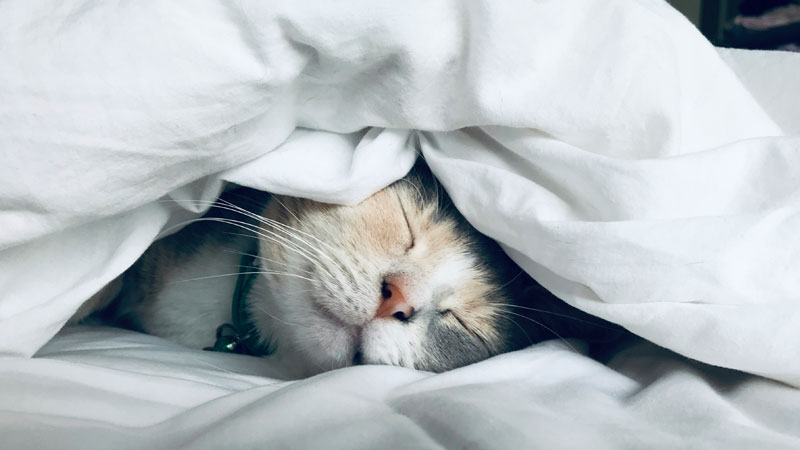Is A cold Contagious To A Cat?

Photo by Kate Stone Matheson on Quora
The common cold is an ailment that most individuals contend with several times a year, often accompanied by discomfort and congestion. As devoted pet owners, the concern about whether our feline companions can catch a cold from us arises.
In this comprehensive exploration, we will delve into the intricacies of feline respiratory health, examining the potential transmission of human colds to cats, common respiratory infections in felines, their symptoms, and how to provide the best care for our beloved pets.
Can Felines Contract Human Colds?
When we catch a cold, it's typically due to viruses causing upper respiratory symptoms like a sore throat, cough, runny nose, congestion, headache, and body aches. However, the majority of cold-causing viruses in humans are specific to our species. As a result, the likelihood of transmitting your cold virus to your cat is minimal.
It's crucial to note that while your cat is unlikely to catch your cold, certain respiratory viruses, such as influenza A and the SARS-CoV-2 virus responsible for COVID-19, can potentially spread from humans to cats. To mitigate this risk, it is advisable to isolate yourself from your cat and have a non-infected individual care for them if you are sick with these specific illnesses. Fortunately, cases of illnesses in domestic cats due to the flu or COVID-19 have generally been mild.
Feline Upper Respiratory Infections: An Overview
Feline upper respiratory infections (URIs) are common ailments that affect cats, causing symptoms similar to human colds. URIs in cats can be caused by various factors, including viruses, bacteria, and fungi. Understanding these factors is crucial for providing appropriate care and timely intervention.
Viruses Responsible for URIs in Cats
The most prevalent viral culprits behind feline URIs are feline herpesvirus 1 and feline calicivirus, accounting for approximately 90% of cases. Unlike human herpesviruses, these viruses are specific to felines. Infection often occurs during kittenhood, and while the cat may carry the virus for life, a healthy immune system typically keeps symptoms at bay. Stress or compromised immunity may lead to recurrent illness.
Bacterial and Fungal Infections in Cats
Bacterial infections contributing to URIs in cats include Bordetella bronchiseptica, various Mycoplasma species, and Chlamydia felis. Fungal infections, though uncommon, can be severe and are caused by Cryptococcus neoformans or C. gattii and Aspergillus. Unlike viral infections, bacterial and fungal URIs often require specific medications for treatment.
Recognizing Symptoms of Colds in Cats
Understanding the symptoms of URIs in cats is vital for early detection and appropriate care. Common symptoms include:
- Sneezing
- Nasal discharge (clear, yellow, or green)
- Runny eyes and inflammation (conjunctivitis)
- Cough
- Mouth or nose sores
- Congestion
- Snoring
- Fever
- Voice changes (hoarse meowing)
These symptoms may vary in intensity, and observing any of them warrants a closer look and potential veterinary intervention.
Treating Colds in Cats: Supportive Care and Medical Intervention
Most cats recover from viral URIs within 7-10 days without specific medication. Supportive care is essential during this period and includes:
Ensuring Adequate Nutrition and Hydration: Make sure your cat is eating well and drinking plenty of water. Strong-smelling canned food can be enticing, especially if the cat's sense of smell is affected.
Isolation and Stress Reduction: Keep your cat isolated from other cats in the household to prevent the spread of the infection. Create a stress-free and quiet environment to aid in recovery.
Humidification for Congestion: If your cat experiences congestion, using a humidifier or placing them in a bathroom with a running shower can help break up congestion.
If symptoms persist or worsen, or if severe signs such as refusal to eat, breathing difficulties, lethargy, behavior changes, or fever occur, a prompt visit to the veterinarian is essential. Bacterial and fungal infections may require specific medications, and in severe cases, hospitalization may be necessary.
Conclusion
While the likelihood of your cat catching your specific human cold is low, understanding the dynamics of feline respiratory infections is crucial for providing the best possible care. Regular veterinary check-ups, a stress-free environment, and timely intervention when symptoms arise are key elements in ensuring your feline companion's respiratory health.





